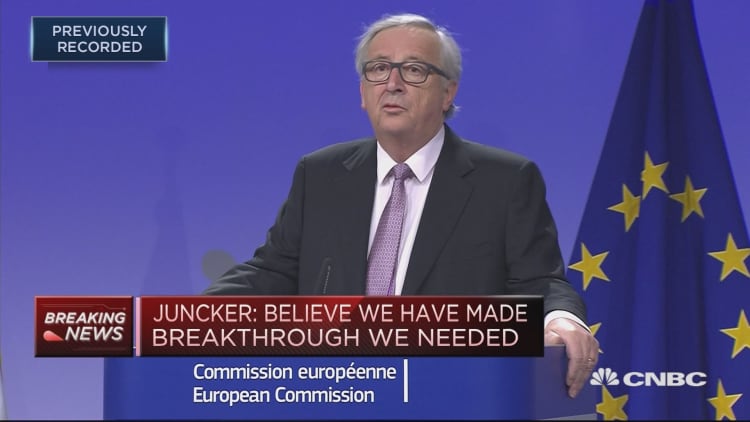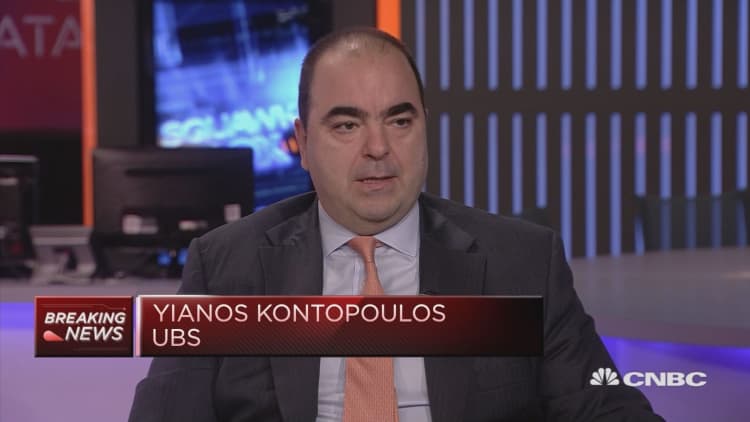
U.K. and European negotiators finally agreed on three key issues that were blocking Brexit talks, paving the way for the next phase of discussion between the two sides.
"We have now made the breakthrough we needed," European Commission President Jean-Claude Juncker told reporters in Brussels on Friday morning.
After six months of intense talks, a settlement has been reached on how much the U.K. will pay before it leaves the Union, on citizens' rights and on the Irish border. Negotiators are now set to move to phase two of Brexit — discussing trade arrangements.
"We worked extremely hard this week," U.K. Prime Minister Theresa May said Friday, speaking alongside Juncker. She added that there had been a lot of "give and take" from both sides.
After overnight talks and an early flight to the Belgian capital, May detailed the agreement. She said the rights of 3 million European citizens in the U.K. were guaranteed and that the financial settlement would be "fair to the British taxpayer." At the same time, she added that there will be "no hard border" between Northern Ireland and the Republic of Ireland.
The latter has been in particular focus over the past days after May's coalition partner in the U.K. government, the Democratic Unionist Party (DUP), said it could not accept a "regulatory alignment" between Northern Ireland and the Republic of Ireland, if that were to mean regulations diverged from the rest of the U.K.
On Friday, the new deal offered assurances on the border issue and said there could even be "specific solutions" to address the unique circumstances of the island of Ireland.
Brexit negotiations are not over
Agreeing on these three issues was initially seen by many as the easiest part of the U.K.'s departure from the EU, but quickly became complicated and time consuming. European leaders are now set to approve the latest joint deal on Thursday at a summit in Brussels. However, the process is far from concluded.
"We still have a lot of work to do," Juncker said, "the joint report is not the withdrawal agreement," he pointed out.
The EU and the U.K. have yet to agree on a future trade deal, as well as on a possible transition period before any future relationship officially begins.
There were fears that following a couple of months of delay in the negotiations, the process of the U.K.'s departure from the EU could be at risk. The country is set to leave the Union on March 29, 2019 — meaning that negotiators have a couple of months to talk trade before the deal is sent through the many steps of European lawmaking and approved in time.
"So much time has been devoted to the easier part of the task. And now, to negotiate a transition arrangement and a framework for our future relationship, we have de facto less than a year," European Council President Donald Tusk warned Friday morning.
Sterling drops on the news
The "breakthrough" sent the pound higher against the euro, with the single currency hitting a five-month low. Most markets players had already priced in some sort of agreement between the U.K. and the EU before European leaders meet next week in Brussels. The pound initially fell against the dollar, but soon tracked higher and hit 1.3499 by 8:30 a.m. London time.

The world reacts
The DUP said Friday morning that there is more work to do on the Irish border arrangements. At the same time, the Irish Deputy Prime Minister, Simon Coveney, said: "We have a good outcome, this has been a difficult negotiation, I hope both sides are happy with what we have."
In Scotland, First Minister Nicola Sturgeon said: "If Brexit is happening (wish it wasn't) staying in single market and customs union is only sensible option."
Meanwhile, the U.K.'s finance minister Philip Hammond said Friday that he was "delighted" a deal had been reached.
Nigel Farage, a leading Brexit campaigner, underlined his distaste for the negotiations on Twitter: "A deal in Brussels is good news for Mrs May as we can now move on to the next stage of humiliation."


